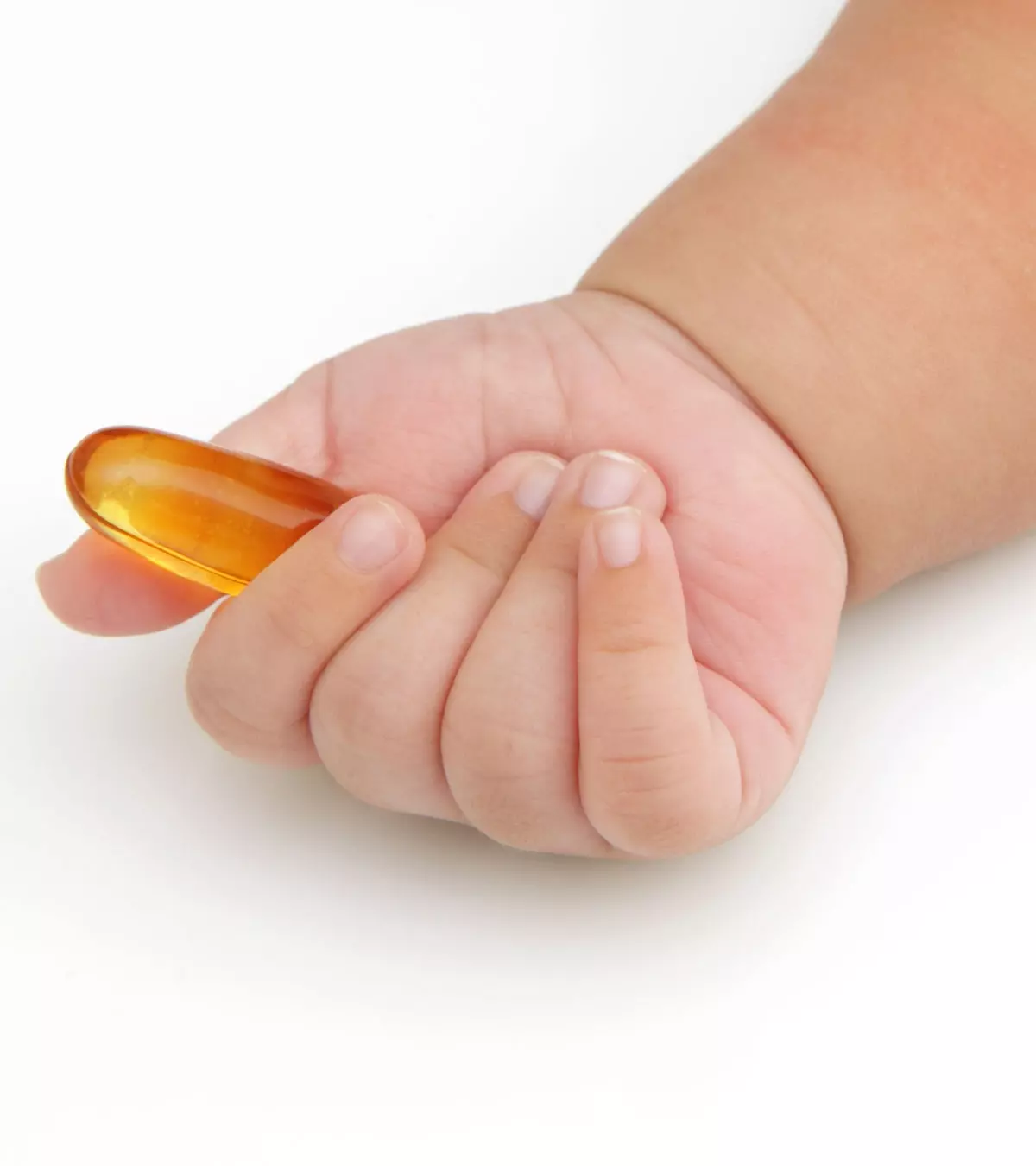
Image: Shutterstock
Fish oil for babies could be an effective way to supplement omega-3 fatty acids in their diet.

Fish is one of the richest sources of omega-3 fatty acids. DHA (docosahexaenoic acid) is vital for the development of the brain and eyes, making it an important nutrient for babies.
However, if they can’t eat it for some reason, you may give them fish oil instead.
Read on to know more about the safety of fish oil for babies, the right age when babies can eat fish, its possible health benefits, and side effects.
Key Pointers
- Fish oil is rich in omega-3 fatty acids and can benefit babies’ brain, eye, heart, immunity, bone, and skincare health.
- Caution should be taken when giving fish oil to babies due to potential discomfort, drug interaction, harmful ingredients, allergy, and overdose.
- Avoid giving fish oil to infants with medical conditions or allergies to fish/seafood, as well as those taking certain medications.
- Consult a pediatrician for safe intake limits when giving fish oil to babies.
Is Fish Oil Safe For Babies?

The US Food and Drug Administration (FDA) has marked fish oil “generally recognized as safe (GRAS)” food (1). The safe intake limit is three grams a day for adults. In general, babies under the age of one year need 0.5 grams of omega-3 fatty acids a day (2).
Consult a pediatrician/dietitian to determine the safe intake limit for infants.
When Can Babies Have Fish Oil?
According to the American Academy of Pediatrics (AAP), within a few months of starting solids, an infant’s daily diet should include a variety of foods, including fish (3)
. However, it is not known if the rule applies to fish oil as well. If your baby consumes fish regularly and it suits him/her, then fish oil also might go well with the baby and contribute to infant nutrition. Moderate consumption of fish on a regular basis should be able to meet your baby’s nutritional needs of omega-3 fatty acids. But if you want to introduce fish oil, do consult a pediatrician.
 Point to consider
Point to considerWhat Are The Health Benefits of Fish Oil For Babies?
Fish oil is obtained from the tissues of the oily fish. An example of fish oil is cod liver oil, which is extracted from the liver of the cod, an oily fish. The oil is an excellent source of omega-3 fatty acids, such as EPA (eicosapentaenoic acid) and DHA (docosahexaenoic acid), which cannot be synthesized by the body (4). Below are some of the benefits of fish oil.
- Brain growth and cognitive development: Omega-3 fatty acids, such as EPA and DHA, are required for proper brain growth and cognitive development in infants (5). They also offer neuroprotection and facilitate cognitive development.iDevelopment of a child’s intellectual abilities, including information processing, problem-solving, and decision-making They also offer neuroprotection and facilitate neurological development. DHA deficiency, in specific, is associated with poor cognitive developmenti leading to learning difficulties (6). Using fish oil nutritional supplements with a baby’s well-balanced diet after a doctor consultation might help.
- Eye development: Various research studies have shown that essential fatty acids, such as DHA (omega-3 fatty acids), may be beneficial in aiding the optimum development of vision (7). Besides, DHA may help preserve vision health and fight chronic inflammation of the eyelids in the long run (8).

- Heart health: Regular consumption of fish oils may have heart-protective effects. The omega-3 can possibly lower blood pressure and improve the health of the blood vessels (9). Besides, the fatty acids are also known to reduce triglyceridesiCommon type of fats obtained from food sources and stored in the bloodstream and slow down the plaqueiA buildup of fatty and sticky substances in the blood vessels of the heart build-up (10) (11). These benefits can be relevant to the baby in the long run.
- Immunity: The DHA is found to have immunity-enhancing properties (12). Omega-3 fatty acids also display anti-inflammatory effects that play a vital role in enhancing immunity (13) (14).
 Research finds
Research finds- Bone health: Some studies show that regular consumption of fish oil might have bone protective effects (15), and fish oil supplements can help reduce joint pain and stiffness, promoting joint health (16). However, more clinical trials are needed to establish the exact mechanism. Fish oil also contains vitamin D that helps maintain bone health.
- Skincare: The use of fish oil has shown beneficial effects on the development of the cutaneous systemiOrgan systems, including the skin, hair, and nails that provide protection (from injury and infection) and regulate body temperature . It is reported that fish oil could possibly reduce the severity of some skin conditions, such as eczemaiA skin condition that causes itchy, red, and scaly patches on the skin due to various factors such as allergies, genetics, or stress and dermatitisiInflammatory skin conditions caused by infections, genetics, or reaction to an allergic substance (17). These benefits are attributed to the omega-3 and omega-6 PUFAs present in it.

- Overall health: Besides omega-3 fatty acids, fish oil contains other micronutrients such as iodine, selenium, vitamins A and D, and bioactive compounds. Therefore, regular fish oil intake could help strengthen the immune system and maintain the baby’s overall health and well-being.
It is believed that consuming fish oil can benefit babies with ADHD and asthma. However, this topic has limited research and more studies are needed to confirm the potential benefits.
All the benefits of fish oil confer when it is a part of a well-balanced diet for the baby. But just like any other food item, fish oils have their share of side-effects too.
Possible Side Effects Of Fish Oil In Babies
The following are some of the likely side effects of fish oil.
- General discomfort: Fish oil has some general side effects like causing unpleasant taste in the mouth, bad breath, foul-smelling sweat, and headache (18). These side-effects are mild and may or may not happen to all the babies. Some babies might also experience gastrointestinal issues such as heartburn, nausea, and diarrhea.
- Possible drug interaction: Fish oil can have some possible drug interactions. Therefore, if your baby is on medications, then make sure to discuss with the pediatrician the safety of fish oil (19).
- Harmful ingredients: Some fish oil supplements might contain added substances that may not suit babies. Therefore, selecting a fish oil supplement must be done in consultation with a pediatrician.
- Allergy: An infant who is allergic to seafood might be allergic to fish too. Some basic symptoms of fish allergy are headache, nausea, stomach cramps, indigestion, stuffy or runny nose, and anaphylaxisiAn extreme reaction to an allergen causing breathing difficulties and loss of consciousness (20). If your baby has a seafood allergy or any other existing allergies, then consult a pediatrician before giving fish oil or fish oil supplement.

- Overdose: High dosage of fish oil supplementation is associated with decreased immunity, increased anti-coagulation, and toxicity.
If your baby shows any unusual symptoms after consuming a fish oil supplement, then stop its use and seek prompt medical attention.
When To Avoid Fish Oil For Infants?
Avoid fish oil if the baby.
- Has a medical condition, especially a blood disorder.
- Is allergic to fish or seafood.
- Is on antiplatelet medicines or other medications that may be less effective in the presence of fish oil
Consult a pediatrician since there might be exceptions where the baby might be able to have fish oil safely.
How To Make Your Baby Consume Fish Oil?
It may not be easy to introduce fish oil to babies since they could dislike the taste. The following are some tips to introduce fish oil to a baby.
- Try offering flavored fish oil. The flavor could help mask the fish smell.
- You can mix the flavored fish oil to applesauce or any of your baby’s favorite treats. Add fish oil to a bottle of milk, soft porridge, smoothie, or yogurt.

- Sprinkle fish oil over pureed veggies.
- Once your baby starts to chew, you can opt for chewable fish oil supplements.
Frequently Asked Questions
1. Is omega-3 the same as fish oil?
No. Fish oil is one of the richest sources of omega-3 fatty acids. Therefore, omega-3 fatty acids are often referred to as “fish oil” (21).
2. Can a child have too much omega-3?
Omega-3 for kids may be helpful. However, if not prescribed by a doctor, excess intake of omega-3 fatty acid supplements can be harmful, causing gastrointestinal symptoms and an increased risk of bleeding. Additionally, consuming too much fish oil may increase the risk of ingesting too much mercury (22).
3. Do babies get omega-3 from breast milk?
Yes. Breast milk contains docosahexaenoic acid (DHA), an omega-3 fatty acid essential for babies’ better vision and brain development (23). Hence, maintaining optimum maternal nutrition is vital for the mother and baby.
4. What is the best type of fish oil for babies?
The best type of fish oil for babies is specifically formulated for infants, ensuring it is free from contaminants. Look for products that contain DHA and EPA, and verify that they have been tested for purity and potency.
Fish oils for babies are rich in omega-3 fatty acids that support infant growth and boost their brain, eye, and general health. You may ask a pediatrician for more personalized information to avoid overdosing. However, you must ensure that your baby is not allergic to fish oil. It is also important to buy fish oil from trusted sources and store it safely to avoid contamination with other ingredients. Fish oils are contraindicated in babies with blood disorders and taking blood-thinning medications.
Infographic: Health Benefits And Side Effects Of Fish Oil For Babies
Fish oil can help the baby’s overall growth and development by taking care of their brain health while strengthening their physical growth. But similar to most foods, it can have side effects when taken in excess. So if you plan to introduce the oil to your baby, explore the pros and cons in the infographic below. Illustration: Momjunction Design Team
Illustration: Nutritional Benefits Of Fish Oil For Babies

Image: Stable Diffusion/MomJunction Design Team
Learn from a pediatrician how to properly encourage your children to consume fish oil. Get practical advice and recommendations on introducing fish oil into your child’s daily regimen.
References
1. Marine Oils; Drugs and Lactation Database; National Center For Biotechnology Information
2. Do Kids Need Omega 3 Fats; Eat Right; American Academy of Nutrition and Dietetics
3. Starting Solid Foods; Healthy Children; American Academy Of Pediatrics
4. Fish oil: friend or foe?; Harvard Health Publishing
5. Omega-3 Fatty Acids; U.S Department of Health and Human Services
6. Health Benefits of Docosahexaenoic Acid (DHA); U.S National Library of Medicine
7. Effects of Omega-3 Fatty Acids on Eye Health: Summary; National Center For Biotechnology Information
8. Omega-3 for your eyes; Harvard Health Publishing
9. Omega-3-rich foods: Good for your heart; Harvard Health Publishing
10. Omega-3 fats – Good for your heart; Medline Plus; U.S National Library of Medicine
11. The Truth About Fish Oil, Omega-3 Fatty Acids, and Heart Health; Penn Medicine
12. Nothing fishy about it: Fish oil can boost the immune system; Science Daily
13. Janice K. Kiecolt-Glaser et al.; Omega-3 Fatty Acids and Stress-Induced Immune Dysregulation: Implications for Wound Healing; National Center For Biotechnology Information
14. Fish Oil May Improve Immunity; Michigan State University
15. NASA studies find omega-3 may help reduce bone loss; Science Daily
16. Omega-3 Fatty Acids for Your Health; Arthritis Foundation
17. Tse-Hung Huang et al.; Cosmetic and Therapeutic Applications of Fish Oil’s Fatty Acids on the Skin; National Center For Biotechnology Information
18. Omega-3 Supplements: In Depth; National Center for Complementary and Integrative Health; U.S Department of Health and Human Services
19. Should you consider taking a fish oil supplement?; Harvard Health Publishing
20. Fish Allergy; American College of Allergy, Asthma & Immunology
21. Understanding Omega-3 Fatty Acids or “Fish Oil; Texas Heart Institute
22. What are Omega-3 Fatty Acids; Academy of Nutrition and Dietetics
23. Brian A. Juber et al Breast milk DHA levels may increase after informing women: a community-based cohort study from South Dakota USA; NCBI
24. Stacy E Foran et al.; Measurement of mercury levels in concentrated over-the-counter fish oil preparations: is fish oil healthier than fish?; NCBI
25. N D’Vaz et al.; Fish oil supplementation in early infancy modulates developing infant immune responses; NCBI
Community Experiences
Join the conversation and become a part of our nurturing community! Share your stories, experiences, and insights to connect with fellow parents.
Read full bio of Moloko Mehlape
Read full bio of Swati Patwal
Read full bio of Rohit Garoo
Read full bio of Ghazia Shah


















